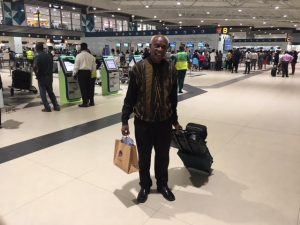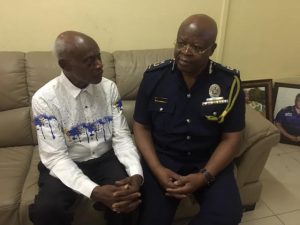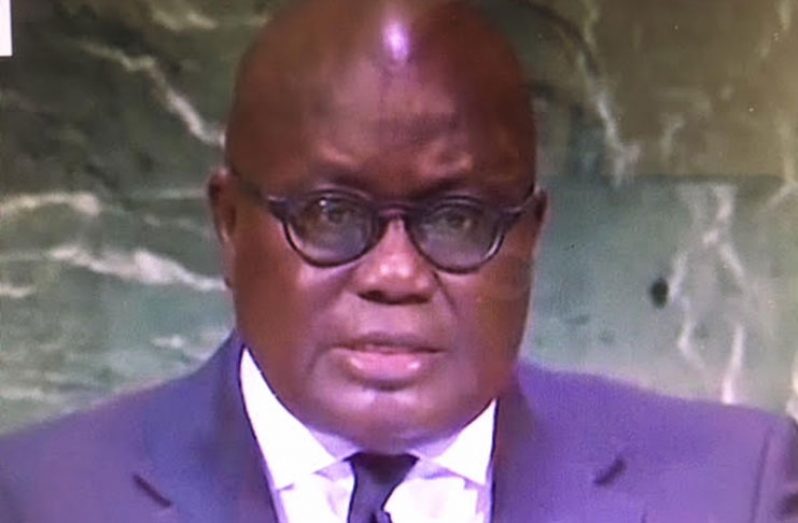By Francis Quamina Farrier
MY recent odyssey in Ghana was my third visit to that West African Republic. It’s a country which I have come to love to visit. The prior visit was when the country was celebrating its 55th Independence anniversary on March 6, 2012. There were some pleasant surprises for me on this September/October 2018 visit. While the country remained 95,000 square miles in area, the population has increased from 25 million to 27 million over the past decade. There have also been two very peaceful General Elections during that period, which resulted in a change of government. General Elections are held every four years during early December.

The very first surprise for me as I arrived in the country on September 28, 2018, was at the Kotoka International Airport. As I walked from that South African Airlines jet after a 10-hour flight from the USA, I entered the Terminal Building of the Kotoka International Airport, Accra and wondered whether I was in the right country! It was a spanking, brand new terminal building. I had no previous knowledge that there was a new terminal building at Kotoka, and so I was really pleasantly surprised. The floor space of that new terminal building is much larger than the previous building and is almost twice the floor space of the Stabroek Market in Georgetown and with two floors to boot! The lower level is for arrivals and the upper level for departures.
Interesting thing, but that impressive new terminal building at the Kotoka International Airport in Accra, Ghana, was commissioned at the very same time that the brand new extension at the Cheddi Jagan International Airport, here in Guyana, was commissioned. That was obviously a case of the two sister Commonwealth countries, making a similar step forward at the very same time. I need to mention a difference between the Kotoka International Airport and the Cheddi Jagan International Airport in terms of their locations. While Guyana’s main International airport at Timehri is about 25 miles from the capital, Georgetown, the Kotoka International Airport is within relative walking distance (at least for me) from the capital city Accra, in Ghana.
My main purpose for this 2018 visit, to Ghana, was to see more of that beautiful and historic African country than I did during my two previous visits. I set out to go to some of the towns which I did not get to visit previously; my travels out of Accra, took me to Ada and Cape Coast on the Atlantic Coast, which for the better part is about 20 to 30 feet above sea level. I also got to the inland towns; Kumasi, Sunyani, Techiman and Tamale and a few smaller rural communities, way up north into the country’s hinterland. They include Dangme, Saltpond, East Akim, Offinso, Abufoa, Kintampo, Kpinkambaya, West Gonja, Nyawrupe and Yapel. There are hundreds of miles of well-paved roads away from the coastland, winding through beautiful hills and magnificent mountains, and crisscrossing the country to many bustling towns and cute little villages and communities, all steeped in Ghanaian culture. Those paved roads also lead into neighbouring countries, such as Burkina Faso at the north, Togo at the east and Cote d’Ivoire to the west.
All of the hundreds of miles of streets and roads which I have traversed in Ghana are littered with speed humps, especially where there are schools. “That is to reduce speeding which has taken many lives, here in Ghana,” a senior police officer told me when I paid a courtesy call at the police headquarters in Accra. Crisscrossing the country for hundreds of miles, I observed many police check-points. Ghana is very security conscious. However, I did not see any evidence of police harassment of drivers. Every stop which was made of the vehicle I was travelling in (both private and public) was done in a professional way. The Motto of the Ghana Police Service is, “Service with Integrity.”
There are a few choices getting to Ghana’s hinterland towns and communities. There are minibuses; both the regular size and those somewhat larger. Then there are the large coaches with plush seats, air conditioning and with a large flat screen up front on which is shown a movie; usually produced in Ghana or Nigeria. There was absolutely no boom-boom box in any of the many minibuses in which I travelled in Ghana, neither was there any over-loading. What I found somewhat amusing, is the way the conductors stick their bodies from waist up out of the bus as they call out to passengers waiting further up the road. Also, how they shake their hand as they hail out perspective passengers. Also of note, is that all minibuses pull right off the road and on to the parapet, to take on or let off passengers. There is no blocking of the flow of traffic. That’s all part of the culture of the Ghanaian minibus operations. Passengers also pay their fare immediately upon entering the minibus, or as soon as possible thereafter. I forgot that at times, only to receive a gentle tap on my shoulder from the conductor. Travelling to some of the up-country locations can also be done by air as there are fleets of small aircraft serving the far-flung hinterland towns.

Ghana is a country of jumbo billboards on which are all sorts of messages; from advertising of products and services, including education and politics, to death announcements. On the latter, there would be a large image of the deceased person; in some cases of the elderly, two images, one of the deceased at a younger age and another of a more recent image. Funerals usually take place a month or even longer after the person has passed. The actual funeral service sometimes takes over three days with various services. I witnessed the funeral of a lady who had died on September 13, 2018 – the funeral ceremonies were held on October 5 and 6. She was 72 years of age and formally of the Ghana Health Service and a Catholic. Among those I saw at that funeral were some Muslims. I mention that because, in Nigeria, Muslims are persecuting Catholics, killing many with impunity, including priests and burning down Catholic churches. In Ghana, Muslims and Catholics coexist in peace and harmony. There is also a range of Christian denominations; Catholics, Anglicans, Methodists, Pentecostals, Jehovah Witnesses, Adventists, Assemblies of God and others, including some indigenous Ghanaian religions. At official events which commence with prayers, both Christian and Muslim prayers are said.
After coups and counter-coups in Ghana during the 1960s and 1970s, Ghana has marched boldly into the realm of a working democracy, and in more recent years has set itself a national policy of establishing Ghana as, “The Most Peaceful country in Africa.” That was demonstrated, when at the December 2012 General Elections, the then Opposition Leader Nana Akufo-Addo, claimed that his party, The New Patriotic Party, was cheated at the polls. He instructed his party members and supporters not to go on any public demonstration or engage in any act of violence. His instructions were obeyed. He took his case of the elections to the High Court but lost. Emerging from the courthouse at the end of the case, he responded to a media query as to what would be his reaction, his response was. “I do not agree with the decision of the Court, but I will abide by it.” After four years as the Leader of the Opposition, Nana Akufo-Addo won the recent General Elections and is now the President of the Republic of Ghana. Ghana remains a peaceful country and continues to attract many tourists.
While I was still in Ghana, former Ghanaian President, Jerry Rawlings, made a public statement of support for President Nana Akufo-Addo, describing the current president as a “Cultured Leader”, and that, “We must all help him.” It will be recalled that the former President of Ghana, Jerry Rawlings, paid a visit to Guyana some years ago. President Akufo-Addo had, just two weeks previously, made a very impressive address at the United Nations 73rd General Assembly in New York, in which he stated, “We in Ghana and other parts of the African continent are determined to pull our countries out of poverty and into prosperity. We do not think that a nation needs to remain poor, or become poor, for others to become prosperous.” Continuing, the Ghanaian president stated, “We believe that there’s room and enough resources on this planet for all of us to be prosperous.” Because of the alphabetical order of seating, representatives from Guyana and Ghana are usually very close to each other at United Nations and other similar international events.
One of the national objectives I’ve noticed when visiting Ghana is the focus on Education, and jobs for young people. As a small example, all of the three boutiques which I patronised while in Ghana were manned by pleasant, professional salespersons, under age 30. There is so much more for me to share from this 2018 visit to Ghana that it is necessary for me to continue next week.












